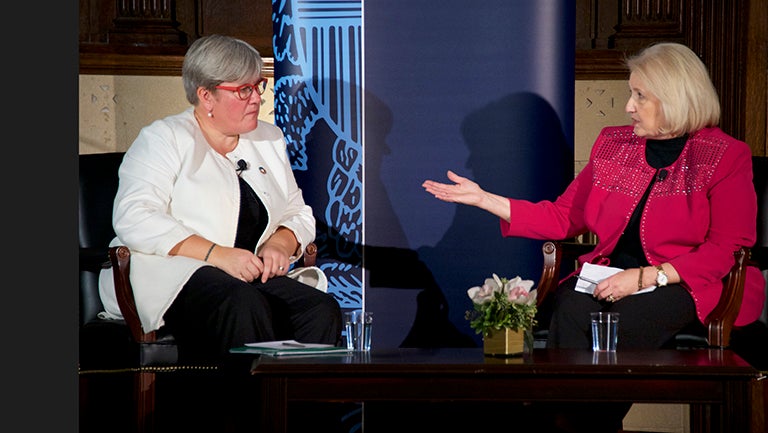Title: U.N. Official: Global Economy Needs Radical Makeover to Fight Climate Change
United Nations official Rachel Kyte speaks at Georgetown on climate change at an event co-sponsored by the university’s Global Futures Initiative, the Georgetown Institute for Women, Peace and Security (GIWPS) and the Georgetown Environment Initiative.

Tackling climate change will require a rapid and complete transformation of the global economy heretofore unseen in human history, said Rachel Kyte, chief executive officer of the U.N. Sustainable Energy for All program, at Georgetown last week.
Co-sponsored by the university’s Global Futures Initiative, the Georgetown Institute for Women, Peace and Security (GIWPS) and the Georgetown Environment Initiative, the event was part of a semester-long dialogue on the environment and the global effort to combat climate change.
Kyte, who spoke on Nov. 7, the first day ofthe United Nations Framework Convention on Climate ChangeConference of Parties 22, talked about the implications of the U.N. Sustainable Development Goals and the 2015 Paris Agreement on Climate Change.
She addressed the steps she believes governments and non-state actors must take to honor their commitments to “de-carbonize” the economy by 2030.
No Time
“For this economic transformation to happen, we need three big transitions,” Kyte said: an alteration in the ways energy is produced and consumed, goods are transported and land resources are managed.
In conversation with GIWPS Executive Director Melanne Verveer, Kyte said it will be difficult to convince the financial sector to invest in seemingly higher risk sustainable development infrastructure and abandoning the coal industry.
For the first time in human development, she said, the energy industry must focus on prioritizing access for everyone.
“The one thing we don’t have now is time,” Kyte said. “There are huge risks of discontinuous change. We need to really get going on forcing the de-carbonization through the economy.”
Bottom-up Agreement
Several audience members asked about holding governments accountable for their commitments following the initial optimism of the Paris Agreement.
“Countries have to start doing a lot of the housekeeping – the sort of stuff that the headlines aren’t written about,” she said. “It’s one thing to have an agreement in place, but the housekeeping of exactly how that agreement is going to work and how we’re going to keep ourselves all accountable, that’s what the negotiators [at COP22] are doing.”
Kyte also underscored the voluntary “bottom-up” nature of the agreement, which relies heavily on the promises of non-state actors, such as companies in the agricultural and financial sectors, to shift their priorities toward a more sustainable development path.
She said the responsibility falls on citizens to exert pressure on their governments to abide by the agreement and meet the self-generated de-carbonization goals.
Economy in Balance
Kyte also addressed the impact of climate change and sustainable practices on women. An initiative by Indian Prime Minister Narendra Modi, she explained, ensures access to clean cookstoves for rural women.
“[There are] 2.9 billion people – many women-headed households – who lack access to clean cooking,” Kyte said.
With the Paris Agreement framework in place and awareness of climate change at near-universal levels, Kyte stressed that the success of the sustainable development goals depends on the willingness of the governments, businesses, and citizens to work together and to hold each other accountable.
The ultimate goal of sustainable development, in Kyte’s words, is to “manage the economy in balance with the chemistry of the planet.”